LSC UoS BA Business Studies: Causation and Effectuation in Business
VerifiedAdded on 2023/06/17
|8
|1745
|429
Essay
AI Summary
This essay explores the concepts of causation and effectuation in entrepreneurship, highlighting the shift from economic inevitability to entrepreneurial contingency. Causation focuses on predefined objectives and strategies to achieve them, while effectuation emphasizes available means and emergent goals. The essay contrasts these approaches, examining their underlying principles, theoretical connections, and implications for businesses at various levels—from startups to established firms. It delves into the decision-making processes associated with each model, discussing how effectuation can foster innovation and adaptability. The essay concludes that while causation is ends-driven, effectuation is means-driven, offering a valuable framework for understanding entrepreneurial action and its impact on markets, industries, and economies. Desklib provides access to this essay and other resources for students.
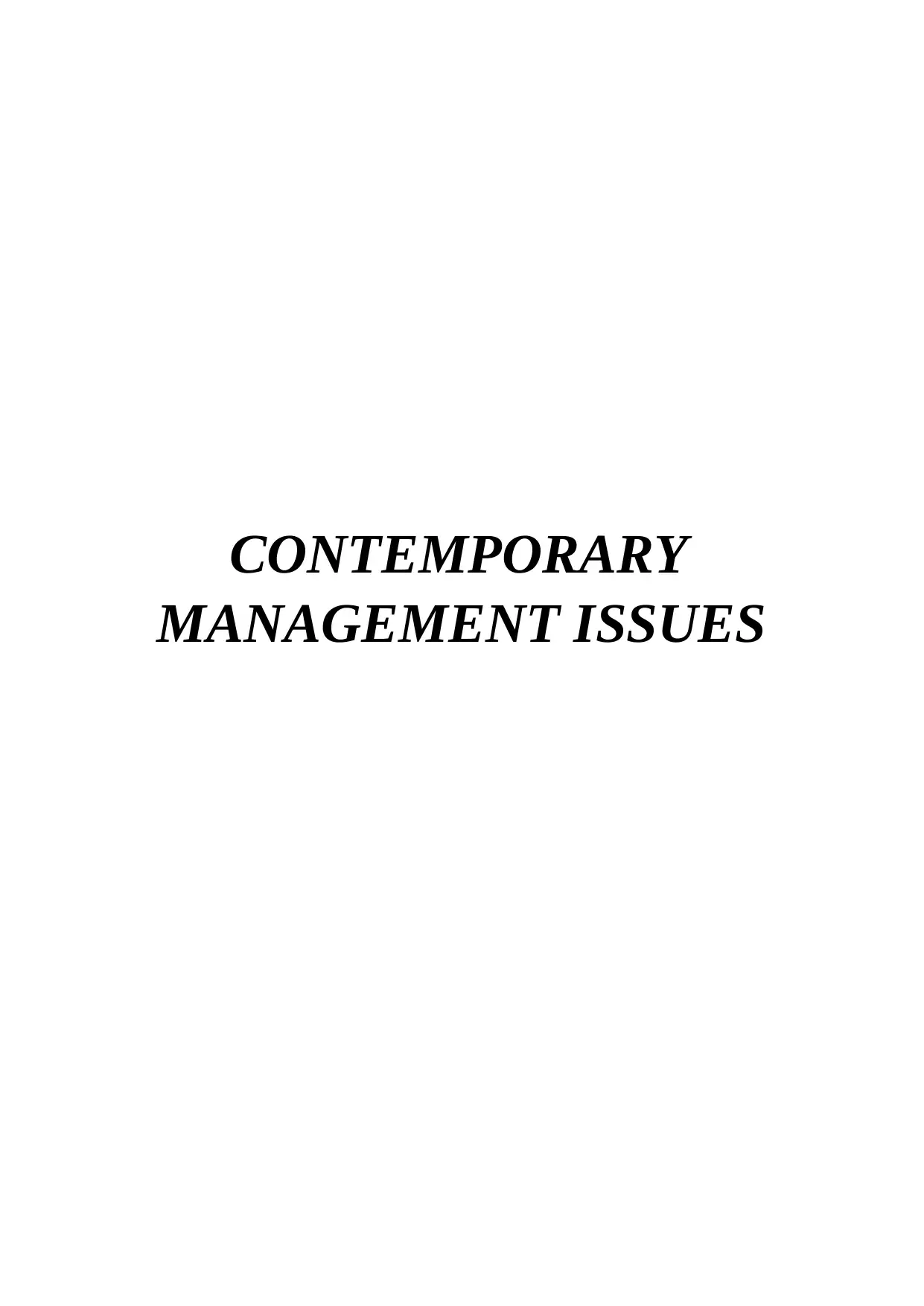
CONTEMPORARY
MANAGEMENT ISSUES
MANAGEMENT ISSUES
Paraphrase This Document
Need a fresh take? Get an instant paraphrase of this document with our AI Paraphraser

Table of Contents
INTRODUCTION....................................................................................................................3
MAIN BODY............................................................................................................................3
REFERENCES.........................................................................................................................8
INTRODUCTION....................................................................................................................3
MAIN BODY............................................................................................................................3
REFERENCES.........................................................................................................................8
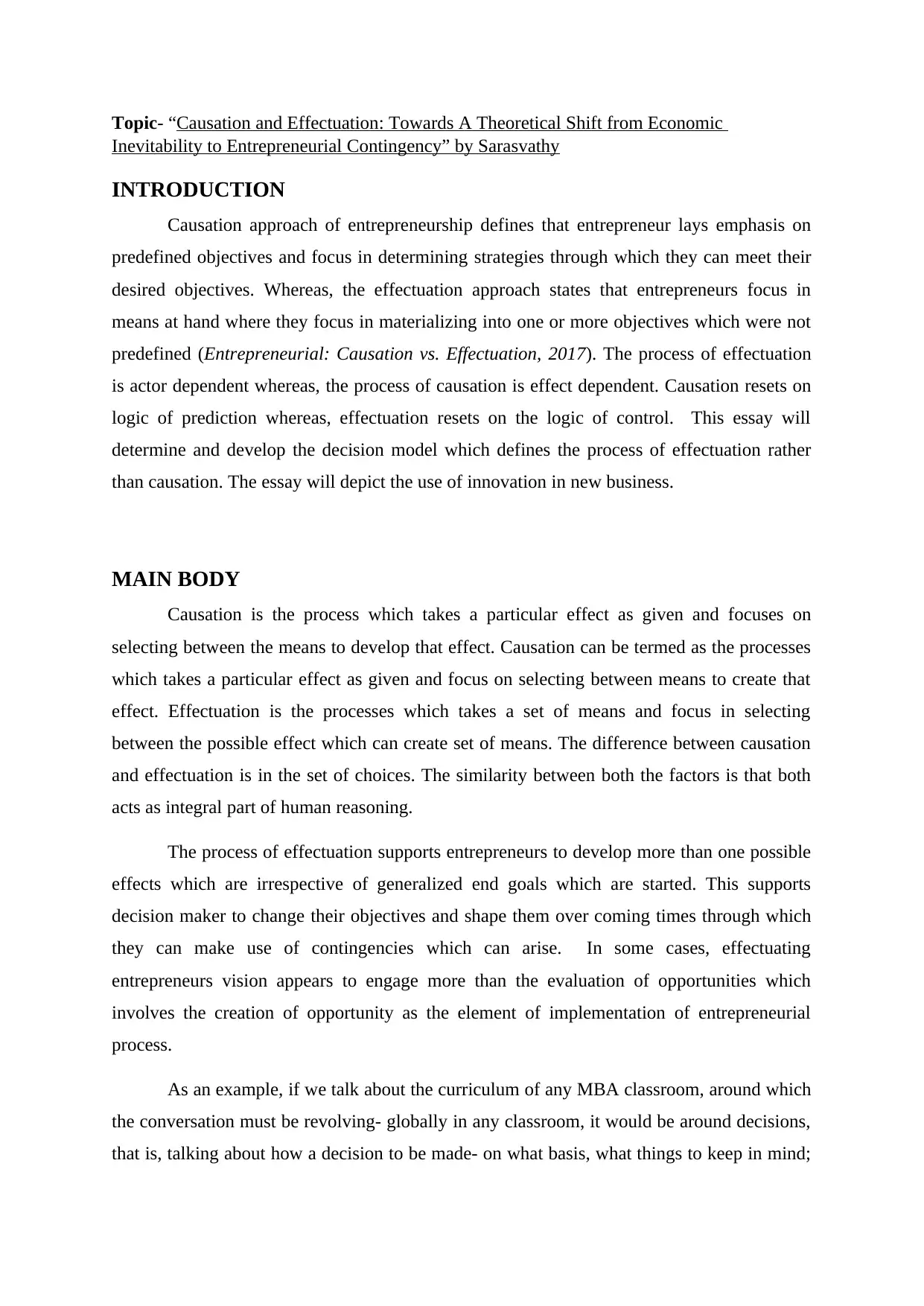
Topic- “Causation and Effectuation: Towards A Theoretical Shift from Economic
Inevitability to Entrepreneurial Contingency” by Sarasvathy
INTRODUCTION
Causation approach of entrepreneurship defines that entrepreneur lays emphasis on
predefined objectives and focus in determining strategies through which they can meet their
desired objectives. Whereas, the effectuation approach states that entrepreneurs focus in
means at hand where they focus in materializing into one or more objectives which were not
predefined (Entrepreneurial: Causation vs. Effectuation, 2017). The process of effectuation
is actor dependent whereas, the process of causation is effect dependent. Causation resets on
logic of prediction whereas, effectuation resets on the logic of control. This essay will
determine and develop the decision model which defines the process of effectuation rather
than causation. The essay will depict the use of innovation in new business.
MAIN BODY
Causation is the process which takes a particular effect as given and focuses on
selecting between the means to develop that effect. Causation can be termed as the processes
which takes a particular effect as given and focus on selecting between means to create that
effect. Effectuation is the processes which takes a set of means and focus in selecting
between the possible effect which can create set of means. The difference between causation
and effectuation is in the set of choices. The similarity between both the factors is that both
acts as integral part of human reasoning.
The process of effectuation supports entrepreneurs to develop more than one possible
effects which are irrespective of generalized end goals which are started. This supports
decision maker to change their objectives and shape them over coming times through which
they can make use of contingencies which can arise. In some cases, effectuating
entrepreneurs vision appears to engage more than the evaluation of opportunities which
involves the creation of opportunity as the element of implementation of entrepreneurial
process.
As an example, if we talk about the curriculum of any MBA classroom, around which
the conversation must be revolving- globally in any classroom, it would be around decisions,
that is, talking about how a decision to be made- on what basis, what things to keep in mind;
Inevitability to Entrepreneurial Contingency” by Sarasvathy
INTRODUCTION
Causation approach of entrepreneurship defines that entrepreneur lays emphasis on
predefined objectives and focus in determining strategies through which they can meet their
desired objectives. Whereas, the effectuation approach states that entrepreneurs focus in
means at hand where they focus in materializing into one or more objectives which were not
predefined (Entrepreneurial: Causation vs. Effectuation, 2017). The process of effectuation
is actor dependent whereas, the process of causation is effect dependent. Causation resets on
logic of prediction whereas, effectuation resets on the logic of control. This essay will
determine and develop the decision model which defines the process of effectuation rather
than causation. The essay will depict the use of innovation in new business.
MAIN BODY
Causation is the process which takes a particular effect as given and focuses on
selecting between the means to develop that effect. Causation can be termed as the processes
which takes a particular effect as given and focus on selecting between means to create that
effect. Effectuation is the processes which takes a set of means and focus in selecting
between the possible effect which can create set of means. The difference between causation
and effectuation is in the set of choices. The similarity between both the factors is that both
acts as integral part of human reasoning.
The process of effectuation supports entrepreneurs to develop more than one possible
effects which are irrespective of generalized end goals which are started. This supports
decision maker to change their objectives and shape them over coming times through which
they can make use of contingencies which can arise. In some cases, effectuating
entrepreneurs vision appears to engage more than the evaluation of opportunities which
involves the creation of opportunity as the element of implementation of entrepreneurial
process.
As an example, if we talk about the curriculum of any MBA classroom, around which
the conversation must be revolving- globally in any classroom, it would be around decisions,
that is, talking about how a decision to be made- on what basis, what things to keep in mind;
⊘ This is a preview!⊘
Do you want full access?
Subscribe today to unlock all pages.

Trusted by 1+ million students worldwide
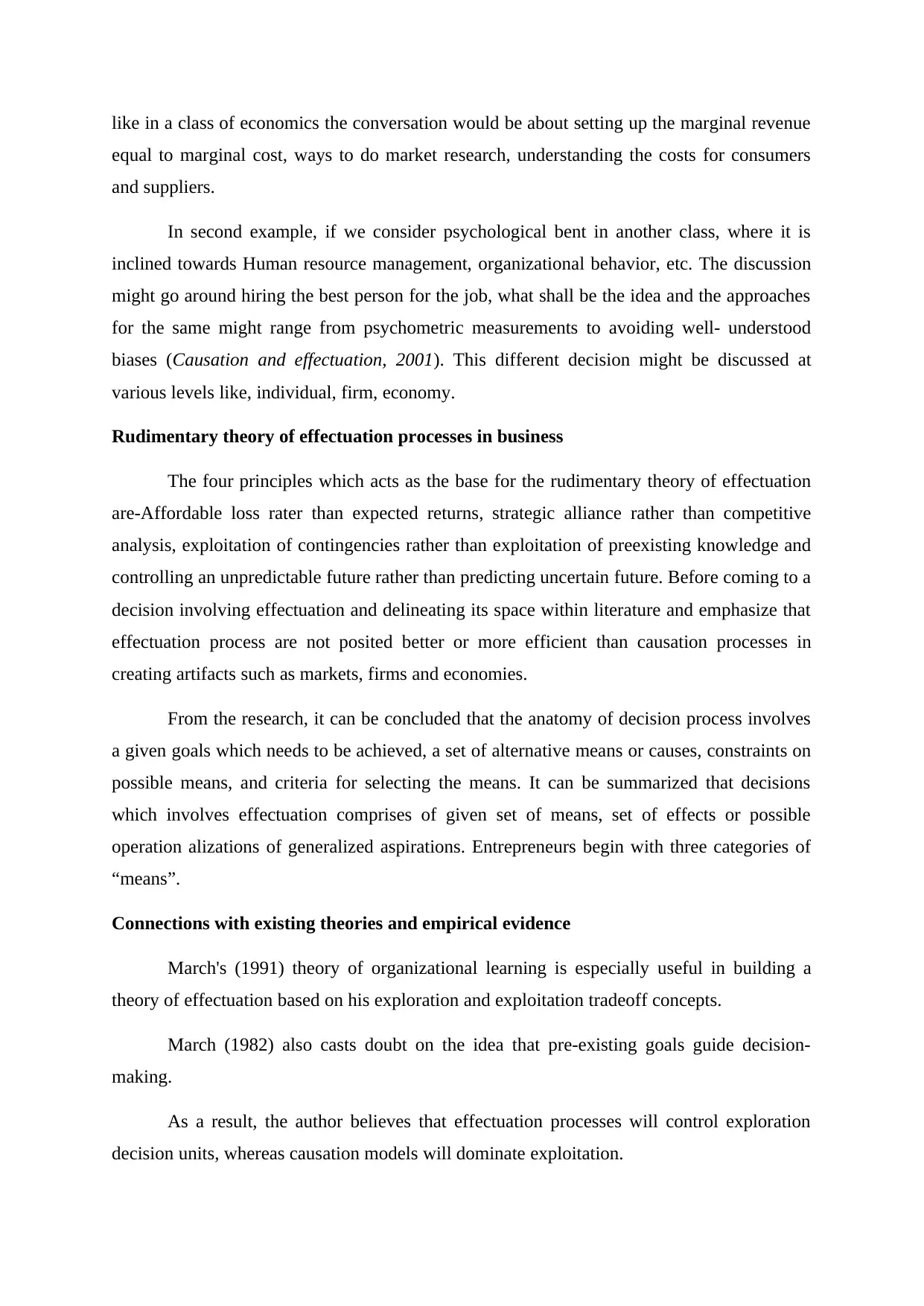
like in a class of economics the conversation would be about setting up the marginal revenue
equal to marginal cost, ways to do market research, understanding the costs for consumers
and suppliers.
In second example, if we consider psychological bent in another class, where it is
inclined towards Human resource management, organizational behavior, etc. The discussion
might go around hiring the best person for the job, what shall be the idea and the approaches
for the same might range from psychometric measurements to avoiding well- understood
biases (Causation and effectuation, 2001). This different decision might be discussed at
various levels like, individual, firm, economy.
Rudimentary theory of effectuation processes in business
The four principles which acts as the base for the rudimentary theory of effectuation
are-Affordable loss rater than expected returns, strategic alliance rather than competitive
analysis, exploitation of contingencies rather than exploitation of preexisting knowledge and
controlling an unpredictable future rather than predicting uncertain future. Before coming to a
decision involving effectuation and delineating its space within literature and emphasize that
effectuation process are not posited better or more efficient than causation processes in
creating artifacts such as markets, firms and economies.
From the research, it can be concluded that the anatomy of decision process involves
a given goals which needs to be achieved, a set of alternative means or causes, constraints on
possible means, and criteria for selecting the means. It can be summarized that decisions
which involves effectuation comprises of given set of means, set of effects or possible
operation alizations of generalized aspirations. Entrepreneurs begin with three categories of
“means”.
Connections with existing theories and empirical evidence
March's (1991) theory of organizational learning is especially useful in building a
theory of effectuation based on his exploration and exploitation tradeoff concepts.
March (1982) also casts doubt on the idea that pre-existing goals guide decision-
making.
As a result, the author believes that effectuation processes will control exploration
decision units, whereas causation models will dominate exploitation.
equal to marginal cost, ways to do market research, understanding the costs for consumers
and suppliers.
In second example, if we consider psychological bent in another class, where it is
inclined towards Human resource management, organizational behavior, etc. The discussion
might go around hiring the best person for the job, what shall be the idea and the approaches
for the same might range from psychometric measurements to avoiding well- understood
biases (Causation and effectuation, 2001). This different decision might be discussed at
various levels like, individual, firm, economy.
Rudimentary theory of effectuation processes in business
The four principles which acts as the base for the rudimentary theory of effectuation
are-Affordable loss rater than expected returns, strategic alliance rather than competitive
analysis, exploitation of contingencies rather than exploitation of preexisting knowledge and
controlling an unpredictable future rather than predicting uncertain future. Before coming to a
decision involving effectuation and delineating its space within literature and emphasize that
effectuation process are not posited better or more efficient than causation processes in
creating artifacts such as markets, firms and economies.
From the research, it can be concluded that the anatomy of decision process involves
a given goals which needs to be achieved, a set of alternative means or causes, constraints on
possible means, and criteria for selecting the means. It can be summarized that decisions
which involves effectuation comprises of given set of means, set of effects or possible
operation alizations of generalized aspirations. Entrepreneurs begin with three categories of
“means”.
Connections with existing theories and empirical evidence
March's (1991) theory of organizational learning is especially useful in building a
theory of effectuation based on his exploration and exploitation tradeoff concepts.
March (1982) also casts doubt on the idea that pre-existing goals guide decision-
making.
As a result, the author believes that effectuation processes will control exploration
decision units, whereas causation models will dominate exploitation.
Paraphrase This Document
Need a fresh take? Get an instant paraphrase of this document with our AI Paraphraser
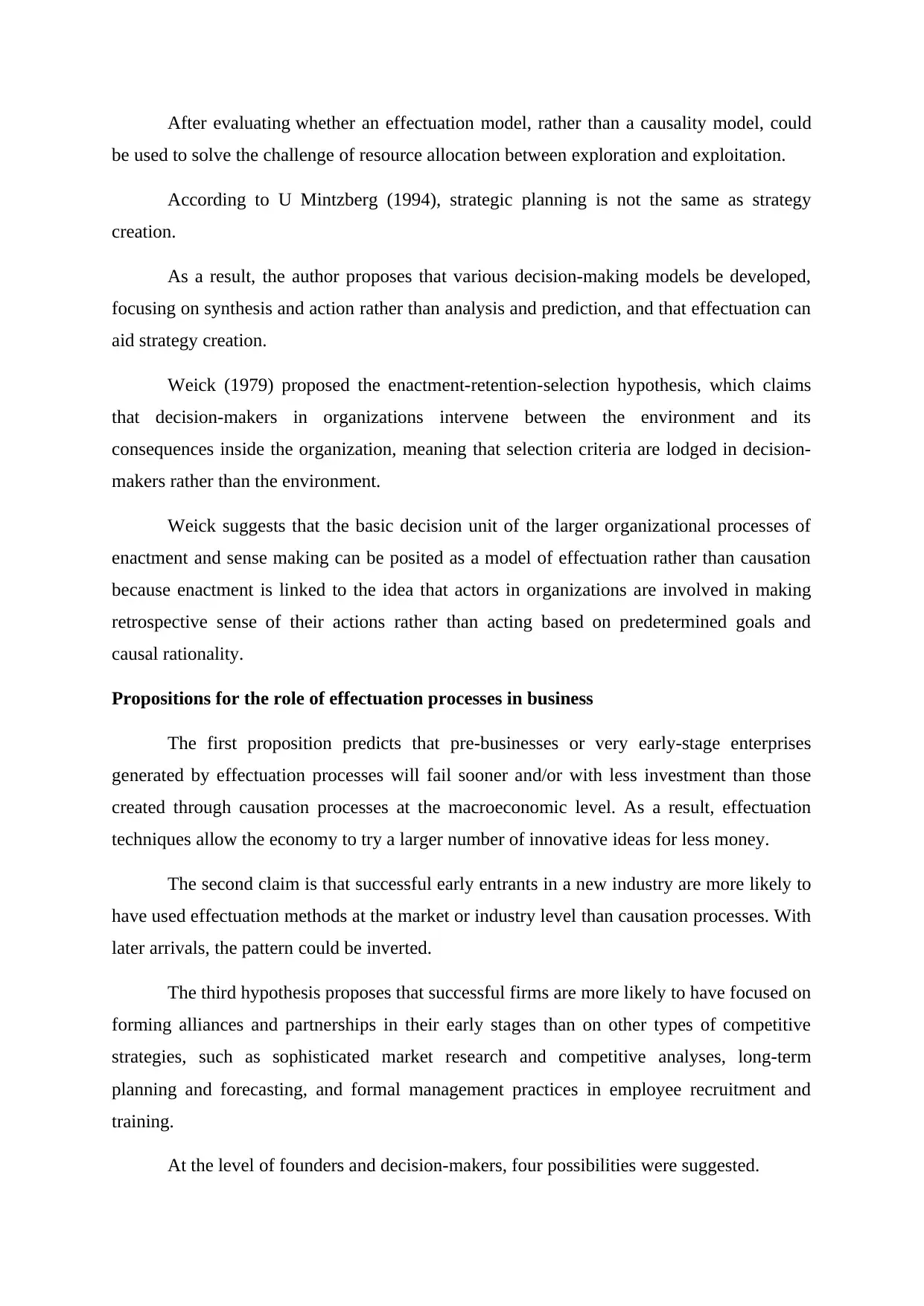
After evaluating whether an effectuation model, rather than a causality model, could
be used to solve the challenge of resource allocation between exploration and exploitation.
According to U Mintzberg (1994), strategic planning is not the same as strategy
creation.
As a result, the author proposes that various decision-making models be developed,
focusing on synthesis and action rather than analysis and prediction, and that effectuation can
aid strategy creation.
Weick (1979) proposed the enactment-retention-selection hypothesis, which claims
that decision-makers in organizations intervene between the environment and its
consequences inside the organization, meaning that selection criteria are lodged in decision-
makers rather than the environment.
Weick suggests that the basic decision unit of the larger organizational processes of
enactment and sense making can be posited as a model of effectuation rather than causation
because enactment is linked to the idea that actors in organizations are involved in making
retrospective sense of their actions rather than acting based on predetermined goals and
causal rationality.
Propositions for the role of effectuation processes in business
The first proposition predicts that pre-businesses or very early-stage enterprises
generated by effectuation processes will fail sooner and/or with less investment than those
created through causation processes at the macroeconomic level. As a result, effectuation
techniques allow the economy to try a larger number of innovative ideas for less money.
The second claim is that successful early entrants in a new industry are more likely to
have used effectuation methods at the market or industry level than causation processes. With
later arrivals, the pattern could be inverted.
The third hypothesis proposes that successful firms are more likely to have focused on
forming alliances and partnerships in their early stages than on other types of competitive
strategies, such as sophisticated market research and competitive analyses, long-term
planning and forecasting, and formal management practices in employee recruitment and
training.
At the level of founders and decision-makers, four possibilities were suggested.
be used to solve the challenge of resource allocation between exploration and exploitation.
According to U Mintzberg (1994), strategic planning is not the same as strategy
creation.
As a result, the author proposes that various decision-making models be developed,
focusing on synthesis and action rather than analysis and prediction, and that effectuation can
aid strategy creation.
Weick (1979) proposed the enactment-retention-selection hypothesis, which claims
that decision-makers in organizations intervene between the environment and its
consequences inside the organization, meaning that selection criteria are lodged in decision-
makers rather than the environment.
Weick suggests that the basic decision unit of the larger organizational processes of
enactment and sense making can be posited as a model of effectuation rather than causation
because enactment is linked to the idea that actors in organizations are involved in making
retrospective sense of their actions rather than acting based on predetermined goals and
causal rationality.
Propositions for the role of effectuation processes in business
The first proposition predicts that pre-businesses or very early-stage enterprises
generated by effectuation processes will fail sooner and/or with less investment than those
created through causation processes at the macroeconomic level. As a result, effectuation
techniques allow the economy to try a larger number of innovative ideas for less money.
The second claim is that successful early entrants in a new industry are more likely to
have used effectuation methods at the market or industry level than causation processes. With
later arrivals, the pattern could be inverted.
The third hypothesis proposes that successful firms are more likely to have focused on
forming alliances and partnerships in their early stages than on other types of competitive
strategies, such as sophisticated market research and competitive analyses, long-term
planning and forecasting, and formal management practices in employee recruitment and
training.
At the level of founders and decision-makers, four possibilities were suggested.
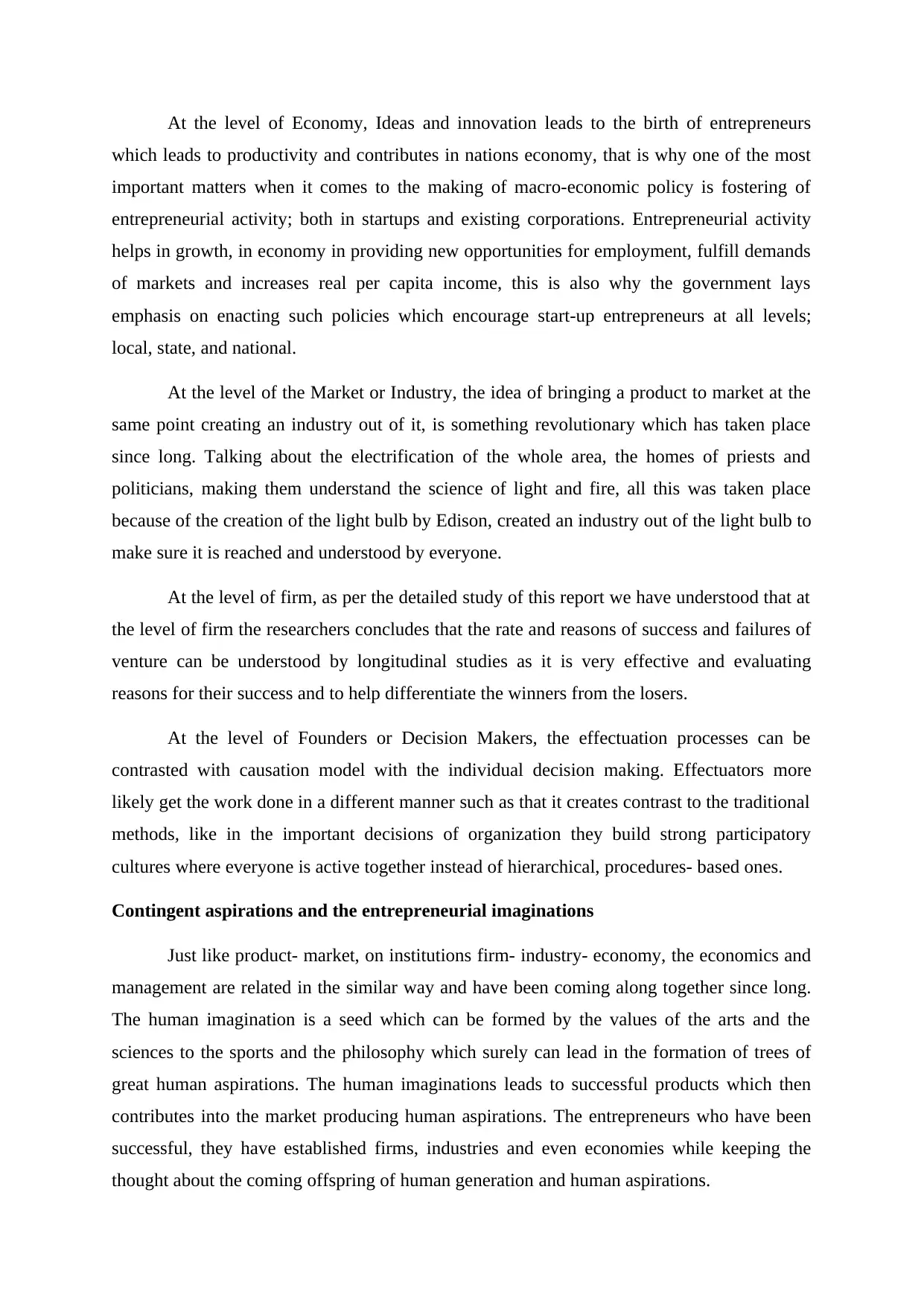
At the level of Economy, Ideas and innovation leads to the birth of entrepreneurs
which leads to productivity and contributes in nations economy, that is why one of the most
important matters when it comes to the making of macro-economic policy is fostering of
entrepreneurial activity; both in startups and existing corporations. Entrepreneurial activity
helps in growth, in economy in providing new opportunities for employment, fulfill demands
of markets and increases real per capita income, this is also why the government lays
emphasis on enacting such policies which encourage start-up entrepreneurs at all levels;
local, state, and national.
At the level of the Market or Industry, the idea of bringing a product to market at the
same point creating an industry out of it, is something revolutionary which has taken place
since long. Talking about the electrification of the whole area, the homes of priests and
politicians, making them understand the science of light and fire, all this was taken place
because of the creation of the light bulb by Edison, created an industry out of the light bulb to
make sure it is reached and understood by everyone.
At the level of firm, as per the detailed study of this report we have understood that at
the level of firm the researchers concludes that the rate and reasons of success and failures of
venture can be understood by longitudinal studies as it is very effective and evaluating
reasons for their success and to help differentiate the winners from the losers.
At the level of Founders or Decision Makers, the effectuation processes can be
contrasted with causation model with the individual decision making. Effectuators more
likely get the work done in a different manner such as that it creates contrast to the traditional
methods, like in the important decisions of organization they build strong participatory
cultures where everyone is active together instead of hierarchical, procedures- based ones.
Contingent aspirations and the entrepreneurial imaginations
Just like product- market, on institutions firm- industry- economy, the economics and
management are related in the similar way and have been coming along together since long.
The human imagination is a seed which can be formed by the values of the arts and the
sciences to the sports and the philosophy which surely can lead in the formation of trees of
great human aspirations. The human imaginations leads to successful products which then
contributes into the market producing human aspirations. The entrepreneurs who have been
successful, they have established firms, industries and even economies while keeping the
thought about the coming offspring of human generation and human aspirations.
which leads to productivity and contributes in nations economy, that is why one of the most
important matters when it comes to the making of macro-economic policy is fostering of
entrepreneurial activity; both in startups and existing corporations. Entrepreneurial activity
helps in growth, in economy in providing new opportunities for employment, fulfill demands
of markets and increases real per capita income, this is also why the government lays
emphasis on enacting such policies which encourage start-up entrepreneurs at all levels;
local, state, and national.
At the level of the Market or Industry, the idea of bringing a product to market at the
same point creating an industry out of it, is something revolutionary which has taken place
since long. Talking about the electrification of the whole area, the homes of priests and
politicians, making them understand the science of light and fire, all this was taken place
because of the creation of the light bulb by Edison, created an industry out of the light bulb to
make sure it is reached and understood by everyone.
At the level of firm, as per the detailed study of this report we have understood that at
the level of firm the researchers concludes that the rate and reasons of success and failures of
venture can be understood by longitudinal studies as it is very effective and evaluating
reasons for their success and to help differentiate the winners from the losers.
At the level of Founders or Decision Makers, the effectuation processes can be
contrasted with causation model with the individual decision making. Effectuators more
likely get the work done in a different manner such as that it creates contrast to the traditional
methods, like in the important decisions of organization they build strong participatory
cultures where everyone is active together instead of hierarchical, procedures- based ones.
Contingent aspirations and the entrepreneurial imaginations
Just like product- market, on institutions firm- industry- economy, the economics and
management are related in the similar way and have been coming along together since long.
The human imagination is a seed which can be formed by the values of the arts and the
sciences to the sports and the philosophy which surely can lead in the formation of trees of
great human aspirations. The human imaginations leads to successful products which then
contributes into the market producing human aspirations. The entrepreneurs who have been
successful, they have established firms, industries and even economies while keeping the
thought about the coming offspring of human generation and human aspirations.
⊘ This is a preview!⊘
Do you want full access?
Subscribe today to unlock all pages.

Trusted by 1+ million students worldwide
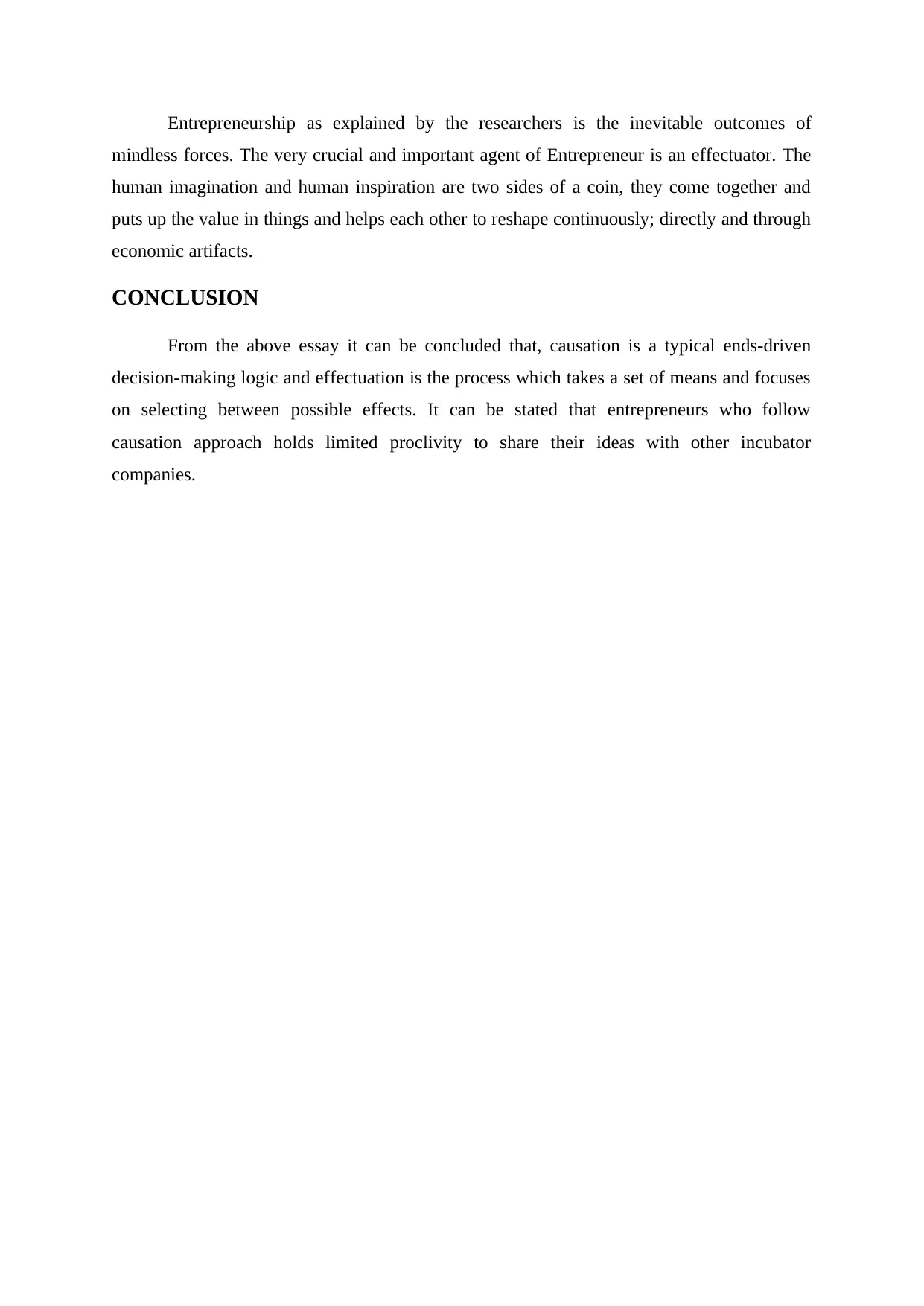
Entrepreneurship as explained by the researchers is the inevitable outcomes of
mindless forces. The very crucial and important agent of Entrepreneur is an effectuator. The
human imagination and human inspiration are two sides of a coin, they come together and
puts up the value in things and helps each other to reshape continuously; directly and through
economic artifacts.
CONCLUSION
From the above essay it can be concluded that, causation is a typical ends-driven
decision-making logic and effectuation is the process which takes a set of means and focuses
on selecting between possible effects. It can be stated that entrepreneurs who follow
causation approach holds limited proclivity to share their ideas with other incubator
companies.
mindless forces. The very crucial and important agent of Entrepreneur is an effectuator. The
human imagination and human inspiration are two sides of a coin, they come together and
puts up the value in things and helps each other to reshape continuously; directly and through
economic artifacts.
CONCLUSION
From the above essay it can be concluded that, causation is a typical ends-driven
decision-making logic and effectuation is the process which takes a set of means and focuses
on selecting between possible effects. It can be stated that entrepreneurs who follow
causation approach holds limited proclivity to share their ideas with other incubator
companies.
Paraphrase This Document
Need a fresh take? Get an instant paraphrase of this document with our AI Paraphraser

REFERENCES
Online
Entrepreneurial: Causation vs. Effectuation, 2017 [Online]. Available through
<https://www.degruyter.com/document/doi/10.1515/erj-2017-0065/html>
Causation and effectuation, 2001 [Online]. Available through
<https://www.researchgate.net/publication/228264546_Causation_and_Effectuation_T
oward_A_Theoretical_Shift_from_Economic_Inevitability_to_Entrepreneurial_Contin
gency>
Online
Entrepreneurial: Causation vs. Effectuation, 2017 [Online]. Available through
<https://www.degruyter.com/document/doi/10.1515/erj-2017-0065/html>
Causation and effectuation, 2001 [Online]. Available through
<https://www.researchgate.net/publication/228264546_Causation_and_Effectuation_T
oward_A_Theoretical_Shift_from_Economic_Inevitability_to_Entrepreneurial_Contin
gency>
1 out of 8
Related Documents
Your All-in-One AI-Powered Toolkit for Academic Success.
+13062052269
info@desklib.com
Available 24*7 on WhatsApp / Email
![[object Object]](/_next/static/media/star-bottom.7253800d.svg)
Unlock your academic potential
Copyright © 2020–2026 A2Z Services. All Rights Reserved. Developed and managed by ZUCOL.

